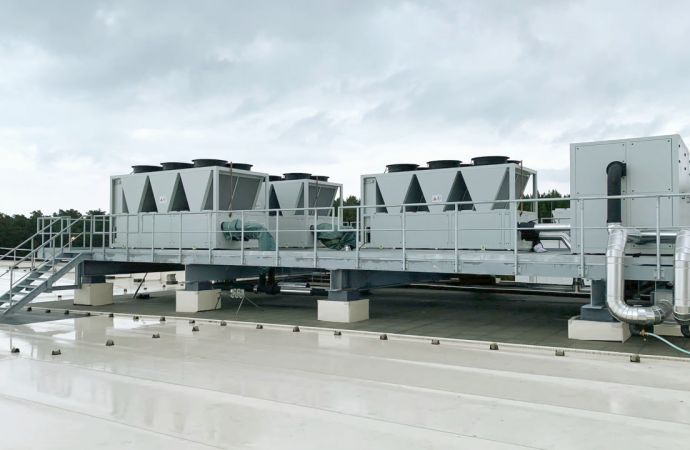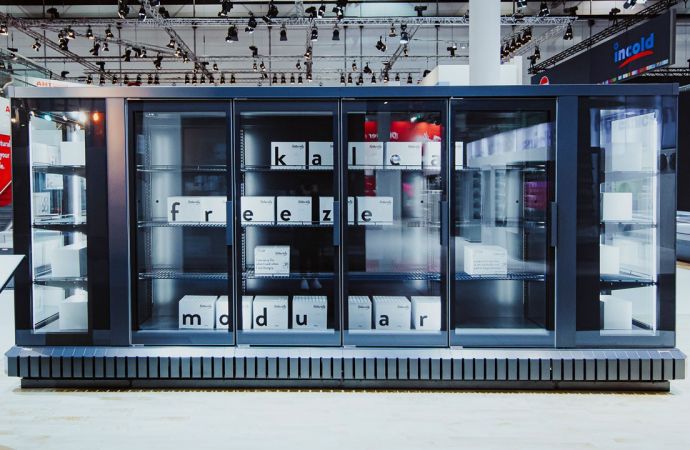Quality Food Centers has installed glass doors in more than half of its 62 stores, without losing sales.

Mount Si behind QFC grocery store in North Bend, Wash.
Coutesy of Wikimedia Commons
As part of a wide-ranging program to save energy, Quality Food Centers (QFC), a 62-store division of Kroger based in Bellevue, Wash., U.S., has so far installed glass doors on existing medium-temperature display cases in more than half of its outlets, without adversely impacting sales.
“QFC is a trailblazer for glass-door retrofits,” said Xinpei Li, Division Energy Manager for QFC, during a session called “Energy Efficiency Management in Supermarkets,” at the Food Marketing Institute (FMI) Energy & Store Development Conference, held in Dallas, September 8-10.
The glass doors have been installed in beer, dairy, deli and lunch-meat cases, but not in produce and fresh meat/seafood, Li said. Local utilities have offered rebates to reduce the cost of the doors.
Though some chains have reported losing sales after installing glass doors on open medium-temperature display cases, customer reaction to the doors has been positive at QFC, Li said. “When the doors are put on right and kept clean and are easy to open, customers get what they want.”
In addition to saving energy, the glass doors keep aisles warmer, “which customers appreciate in winter,” said Li. They also help protect products during a power outage.
Li recalled observing a shopper explaining to her young daughter that QFC was putting in glass doors to save energy. “I was touched,” she said. “What we are doing in stores may have an impact on customers and their lifestyles. That’s when I think, ‘I love this industry.’”
QFC is also collaborating with its contractors to identify “energy maintenance opportunities,” said Li. The retailer is also piloting retro-commissioning projects to improve HVAC&R efficiency and doing periodic audits “to make sure there is no ongoing waste of energy or water.”
In 2017, QFC launched an “energy champion” program, assigning an energy leader in every store to oversee energy maintenance. A conference call for the leaders is held periodically to exchange findings and share best practices. The chain recognizes outstanding energy leaders.
New QFC stores are equipped with a range of energy-saving technologies, including LED lighting, motion and occupancy sensors, distributed refrigeration systems, heat reclaim, case controls, digital scrolls and variable-speed compressors.
Kroger’s initiatives
Li also described some of the energy-saving initiatives that QFC’s parent, Kroger – which operates nearly 2,800 stores across 24 chains in 35 U.S. states – is undertaking. For example, in 2019, Kroger has launched a program to dramatically reduce its natural gas and electricity consumption, starting with 175 stores that will replace glass doors on open refrigerated cases; the expected per-store energy reduction is up to 15%, she said.
This year, Kroger is completing a retrofit of interior LED lighting throughout its chains, saving 350 million kWH of energy annually, said Li.
As of 2018, Kroger had installed enough solar and wind equipment to generate more than 14 million kWh of energy, as well as two anerobic digesting facilities. In 2019, the company offered electric vehicle charging stations at 100 stores, with more on the way.
In 2018 and 2018, Kroger was named an Energy Star Partner of the Year by the U.S. Environmental Protection Agency, and operated more than 800 Energy Star buildings by the end of 2018.
“At Kroger, we care about the planet, and how our business affects the planet,” said Li. At the same time, Kroger is assessing how climate risks impact its business.
At Kroger, we care about the planet, and how our business affects the planet."
– Xinpei Li, Quality Food Centers
Related stories



